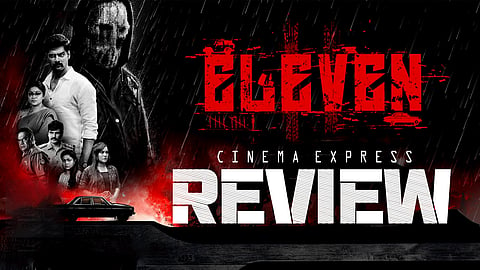Eleven Movie Review: This Naveen Chandra thriller tries to be different but ends up odd
Eleven(2.5 / 5)
Pitch darkness. An empty road. A black car plods along in eerie silence. An owl creepily swivels its head. Dreadful music swells in the background. A figure steps out in heavy boots—each step echoing like a warning—and pours a flammable liquid over a lifeless body before setting it ablaze. This is how Naveen Chandra’s latest cop-chases-serial-killer film Eleven kicks off. It establishes the killer's MO with textbook precision. From there, you hope the film veers off the usual path. But instead, it takes a detour into familiar territory. There is a bank robbery, followed by a glorified hero entry for ACP Aravindan (Naveen), complete with slo-mo, smokes, and swagger, all set to blaring elevation music. And of course, he also solves this stop-gap case. Up until intermission, Eleven clings to the tenets of this genre like it's sacred scripture. Despite an intriguing premise, the film plays it safe for too long, saving all its twists and turns for a final act sprint.
Cast: Naveen Chandra, Abhirami, Dhilipan, Rythvika, Reyaa Hari
Director: Lokesh AJJLS
In this film about stopping serial murders and unmasking a pathological killer, Aravindan finds himself chasing a high-IQ psychopath. With zero leads and the clock ticking, the IPS officer is handed the near-impossible task of stopping more innocents from falling prey to this slayer’s flames.
For the first 20 minutes or so, the film focuses on building the world of ACP Aravindan, an incredibly sharp detective who believes in working smart, not hard. In fact, a villain even tells him, “Nee endha case-a eduthalum mudikkama vida maatiyaame” (You always end up solving the cases you’re assigned). The filmmaker, though, fails to shake off predictability, which sticks out like a clear fingerprint in a crime scene. For most of the first half, both the film and its officers stumble through a rather sedate investigation. Leads are scarce, breakthroughs rarer. No epiphanies, no goosebump-inducing deductions, just a procedural crawl. While the climax does offer an explanation for this lack of spark, for the longest time, it feels like the film is laying the groundwork for a thriller that forgot to bring the thrills. Too much setting, not enough sleuthing.
It is impressive how director Lokesh AJJLS ensures that the sparks he leaves behind as seemingly illogical loopholes eventually effect a huge flame in the final act. While it’s true that the last stroke can complete the painting, here, the director spends so much time trying to outsmart the audience that he forgets to engage them. In such genres, the motive behind the murders adds the real weight. So, when a grand reveal is made at intermission, followed by a flashback meant to humanise the killer, the twist becomes all too guessable. This backstory is designed to tug at our heartstrings, maybe even make us momentarily root for the slayer. But while the premise is fresh and full of potential, what makes Eleven guilty of mediocrity is its writing, which never quite moves us enough to connect, resonate, or even empathise with its tormented protagonist. With sentiment acting as the film’s emotional anchor, the absence of the same weakens the foundation, and drags around with no clear end in sight.
Another aspect that Eleven misses out on is the classic thrill of misdirection. There are no clever red herrings to keep the audience second-guessing. The investigation plays out in binary; the officers either stumble upon a lead or hit a dead end. As mentioned earlier, the final 30 minutes do manage to pull the rug, and finally has red herrings and second guesses before finally unmasking the real culprit.
But after nearly 90 minutes of nothing but groundwork, the twist arrives a little too late. By the time the surprise lands, we’re too burnt out by the slow burn to truly be blown away.
Amidst the darkness of it all, Naveen Chandra’s performance as the charismatic cop comes as the shining light. Single-handedly, he shoulders a film with an innovative concept but is burdened by not-so-supportive supporting actors. While Abhirami and Dhilipan put their best foot forward in their limited roles, the other peripheral characters, key to the film’s development, fail to act in its favour.
In the end, Eleven tries to light up the screen with its innovative premise, but like its own killer, it gets lost in the shadows of predictability and missed opportunities. At the heart of a great thriller is the ability to keep audiences on edge, not just for the twists, but for the emotional ride. Eleven has the pieces but forgets to connect them. In a genre built on suspense, sometimes the greatest crime is failing to keep the audience intrigued.

